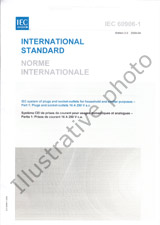We need your consent to use the individual data so that you can see information about your interests, among other things. Click "OK" to give your consent.

IEC/TR 61850-90-21-ed.1.0
Communication networks and systems for power utility automation - Part 90-21: Travelling Wave Fault Location
Translate name
STANDARD published on 12.2.2025
The information about the standard:
Designation standards: IEC/TR 61850-90-21-ed.1.0
Publication date standards: 12.2.2025
SKU: NS-1213307
Approximate weight : 300 g (0.66 lbs)
Country: International technical standard
Category: Technical standards IEC
The category - similar standards:
Annotation of standard text IEC/TR 61850-90-21-ed.1.0 :
IEC TR 61850-90-21:2025, which is a Technical Report, aims to provide background information, use cases, data models and guidance on the application of such a technique. This document will 1) describe the principles of fault location based on travelling waves aided by communications; 2) specify use cases for this method under the following application scenarios: a) Single-ended fault location, b) Double-ended fault location through communications between two devices, c) Double-ended fault location with communications to a master station, d) Wide area fault location applications, e) Pulse radar echo method, f) Substation integration with other fault location and disturbance recording functions, g) Testing and calibration; 3) describe the information model for each use case; 4) give guidance on scheme configuration.
We recommend:
Technical standards updating
Do you want to make sure you use only the valid technical standards?
We can offer you a solution which will provide you a monthly overview concerning the updating of standards which you use.
Would you like to know more? Look at this page.



 Cookies
Cookies
